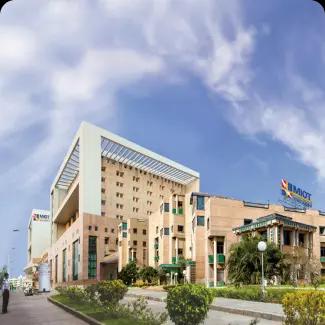
Ovarian Cystectomy
An ovarian cystectomy is a surgical procedure to remove one or more cysts from the ovaries. Ovarian cysts are sacs filled with fluid or other material that form on or inside an ovary. Most ovarian cysts are harmless (benign), but some can be cancerous (malignant). Surgery is typically only recommended for cysts that are large, cause pain or other symptoms, or are suspected to be cancerous.
Free Pick up and Drop
No Cost EMI
Post Surgery Care
An ovarian cystectomy is a surgical procedure to remove one or more cysts from the ovaries. Ovarian cysts are sacs filled with fluid or other material that form on or inside an ovary. Most ovarian cysts are harmless (benign), but some can be cancerous (malignant). Surgery is typically only recommended for cysts that are large, cause pain or other symptoms, or are suspected to be cancerous.
Symptoms Of Ovarian Cystectomy
Symptoms
Types of conditions
There are three main types of Ovarian Cystectomy
Laparoscopy
Laparotomy
Oophorectomy (ovary removal)
Laparoscopy
This is a minimally invasive procedure performed through small incisions in the abdomen. A laparoscope (a thin, lighted tube) is inserted to view the ovaries and cysts. Surgical instruments are then inserted through other small incisions to remove the cyst(s).
TYPES OF OVARIAN CYSTS
- Functional cysts: These are the most common type of ovarian cyst. They form during ovulation and usually disappear on their own within a few months. Examples include follicular cysts and corpus luteum cysts.
- Endometriomas: These cysts are associated with endometriosis, a condition where tissue similar to the lining of the uterus grows outside the uterus. Endometriomas can cause pelvic pain and worsen during menstruation.
- Dermoid cysts: These cysts can contain hair, skin, or other types of tissues.
- Cystadenomas: These are benign tumors that can grow large.
- Cancerous cysts: Less common, but some ovarian cysts can be cancerous.
DIAGNOSIS
- Pelvic exam: To check for abnormalities in the size or shape of the ovaries.
- Ultrasound: To visualize the cyst and determine its size, location, and characteristics.
- Blood tests: To check for tumor markers that may suggest cancer.
- Biopsy: In some cases, a tissue sample may be needed to confirm whether the cyst is benign or malignant.
CAUSES/RISK FACTORS
- Childbirth
- Aging
- Obesity
- Chronic cough
- Heavy lifting
- Connective tissue disorders
- Hysterectomy (in some cases)
PREPARING FOR SURGERY
Pre-operative Consultation
- Discuss the surgery details, potential risks and benefits, and recovery expectations with your doctor.
- Review your medical history, medications, and allergies.
- Undergo a physical exam to assess the pelvic floor and potentially imaging tests.
- Follow specific instructions provided by your doctor, which may include:
- Fasting for a certain period before surgery (usually 8-12 hours).
- Stopping or adjusting certain medications, especially blood thinners.
- Quitting smoking, if applicable, to improve healing and reduce infection risk.
- Wearing loose-fitting clothing for easy access during surgery.
- Arranging transportation and assistance for post-surgical recovery.
TREATMENT DETAILS
There are two main surgical approaches for removing ovarian cysts:
- Laparoscopy: This is a minimally invasive surgery preferred for most cases. The surgeon makes small cuts in your abdomen, inserts a camera to view your organs, and removes the cyst through these tiny incisions.
- Laparotomy: This is a traditional open surgery used for larger or complex cysts. The surgeon makes a larger incision in your lower abdomen to access and remove the cyst. The best surgical approach depends on the specific characteristics of your cyst and your overall health.
RECOVERY
Recovery from an ovarian cystectomy depends on the type of surgery you undergo:
Laparoscopy (minimally invasive): This is generally associated with a quicker recovery. You might feel better within the first week, and resume most activities, including work, within 1-3 weeks. However, you'll likely need to avoid heavy lifting and strenuous exercise for a few weeks. Full healing can take 4-6 weeks.
Laparotomy (open surgery): Recovery from this approach takes longer due to the larger incision. You might need to stay in the hospital for several days and avoid strenuous activity for 6-8 weeks. Full recovery could take up to 12 weeks.
Here are some general recovery tips for both types of surgery:
- Pain management: Your doctor will prescribe medication to manage pain.
- Rest: Take it easy and avoid strenuous activity as instructed by your doctor.
- Incision care: Keep the incision clean and dry according to your doctor's instructions.
- Diet: You might initially be on a restricted diet, gradually progressing to regular meals.
- Activity: Gradually increase your activity level as tolerated.
Your journey to good health begins here

Accredited Hospitals
Nationally accredited hospitals for high-quality care

Multi-language Support
Convey your needs in the language you're most comfortable in

Travel Booking Assistance
Seamless booking assistance for your healthcare journey

Personalised Treatment Plans
A treatment journey tailored to all your preferences and needs

Unparalleled Hospitality
Experience exceptional hospitality during your stay

Easy Medical Visa Approvals
Dedicated assistance for medical visa requirements
Plan your healthcare journey with Karetrip!
India’s Best Hospitals are Partnered With Karetrip
Access World-Class facilities from top Hospitals across India
Consult with India’s most experienced doctors
Experience premium care from India’s leading specialists

Dr. Alka Kriplani
Gynaecologist and Obstetrician
41+ Years Of Experience

Dr. Arwa Mohsin E
Obstetrician and Gynecologist
22+ Years Of Experience

Dr. Meenakshi Ahuja
Obstetrics & Gynaecology
36+ Years Of Experience

Dr. Rajesh Helavar
Obstretician And Gyneacologist
19+ Years Of Experience

Dr. G Usha Reddy
Gynaecologist & Obstetrician
33+ Years Of Experience

Dr. Poonam Rastogi
Obstetrician and Gynaecologist
31+ Years Of Experience
Cost Estimation
Learn about the expenses involved in the procedure and what factors affect them.

Several factors can affect the cost of ovarian cystectomy in India:
- Hospital type and location: Treatment costs can vary depending on the hospital's reputation, location (urban vs. rural areas), and the overall cost of living in the region. High-end hospitals and major cities tend to have higher charges.
- Surgeon's fees and experience: The experience and reputation of the surgeon performing the surgery can influence their fees.
- Facility fees: Costs associated with using the hospital's surgical suites, and other resources contribute to the overall bill.
- Anesthesia fees: The type of anesthesia used during surgery (general vs. local) can affect the cost.
- Length of hospital stay: Complications or additional procedures during treatment can lead to a longer stay, increasing the cost.
- Insurance coverage: Deductibles, co-pays, and out-of-pocket expenses will vary depending on your insurance plan. Some plans may have limited coverage for certain treatments or medications.
The estimated cost of ovarian cystectomy across different cities are given below:
The average cost of the Ovarian Cystectomy in India is around ₹34,760 to ₹98,338.

₹98,338
High Cost
₹98,338
Average Cost
₹34,760
Low Cost
The LIST of AVERAGE COST of the Ovarian Cystectomy across TOP 4 cities in India in Indian Rupee (INR) is as follows :
City
Lowest Cost
Average Cost
Highest Cost
Mumbai
₹36,032
₹60,000
₹93,750
Delhi
₹34,760
₹60,000
₹98,338
Hyderabad
₹ 32,760
₹ 60,000
₹ 93,750
Chennai
₹31,212
₹ 60,000
₹93,750
Commonly Asked Questions
What causes ovarian cysts?
Ovarian cysts can develop for various reasons, including hormonal imbalances during the menstrual cycle, endometriosis, pregnancy, or as a result of an underlying medical condition like polycystic ovary syndrome (PCOS).
Are there different types of ovarian cysts?
Yes, ovarian cysts can vary in type and composition. Common types include functional cysts (follicular and corpus luteum cysts), dermoid cysts, endometriomas, and cystadenomas. Each type may have distinct characteristics and implications for treatment.
Can ovarian cysts lead to complications?
While most ovarian cysts are benign and resolve on their own, they can sometimes cause complications such as ovarian torsion (twisting of the ovary), rupture, or pressure on nearby structures leading to discomfort or pain.
How do doctors determine if an ovarian cyst is cancerous?
Although most ovarian cysts are benign, doctors may recommend further testing, such as blood tests (CA-125) or imaging studies, to assess the risk of malignancy. In some cases, a biopsy may be necessary to confirm the diagnosis.
What treatment options are available for ovarian cysts?
Treatment depends on various factors including the type, size, and symptoms associated with the cyst. Options may include watchful waiting, hormonal contraceptives to regulate the menstrual cycle, or surgical removal (cystectomy).

Do you still have a query?


"I had a successful surgery at Fortis Escorts Hospital, and it was all thanks to Karetrip's help in finding the right hospital for me. The entire process was smooth and stress-free, with Karetrip handling all the arrangements and answering any questions I had. The medical team at the hospital was outstanding, and the facilities were top-notch. I highly recommend Karetrip to anyone looking for a tension-free healthcare experience."
Read MoreFatima
Chattogram


"Thanks to Karetrip, I got connected with MAX Hospital in New Delhi. The team guided me through every step – from finding the right doctor to handling travel and visas. They made a daunting process feel like a breeze. The care I received at MAX Hospital was outstanding, and I can't thank Karetrip enough for making it possible. They truly put patients first and go the extra mile to ensure a smooth healthcare journey. I'm grateful beyond words!"
Read MoreHasan
Dhaka


"At first, I was unsure about having a medical procedure done in a foreign country. However, Karetrip's team at Indraprastha Apollo Hospital made me feel much better. The hospital was very clean, modern, and had everything they needed to help me. The staff were very kind and did everything they could to make me feel comfortable. I'm really happy with how my treatment turned out, and I appreciate Karetrip for making it easy and stress-free."
Read MoreImran
Sylhet
 Google Reviews4.9/5
Google Reviews4.9/5




I had a successful surgery at Fortis Escorts Hospital, and it was all thanks to Karetrip's help in finding the right hospital for me. The entire process was smooth and stress-free, with Karetrip handling all the arrangements and answering any questions I had. The medical team at the hospital was outstanding, and the facilities were top-notch. I highly recommend Karetrip to anyone looking for a tension-free healthcare experience.
Fatima
Chattogram
 Google Reviews4.9/5
Google Reviews4.9/5



















